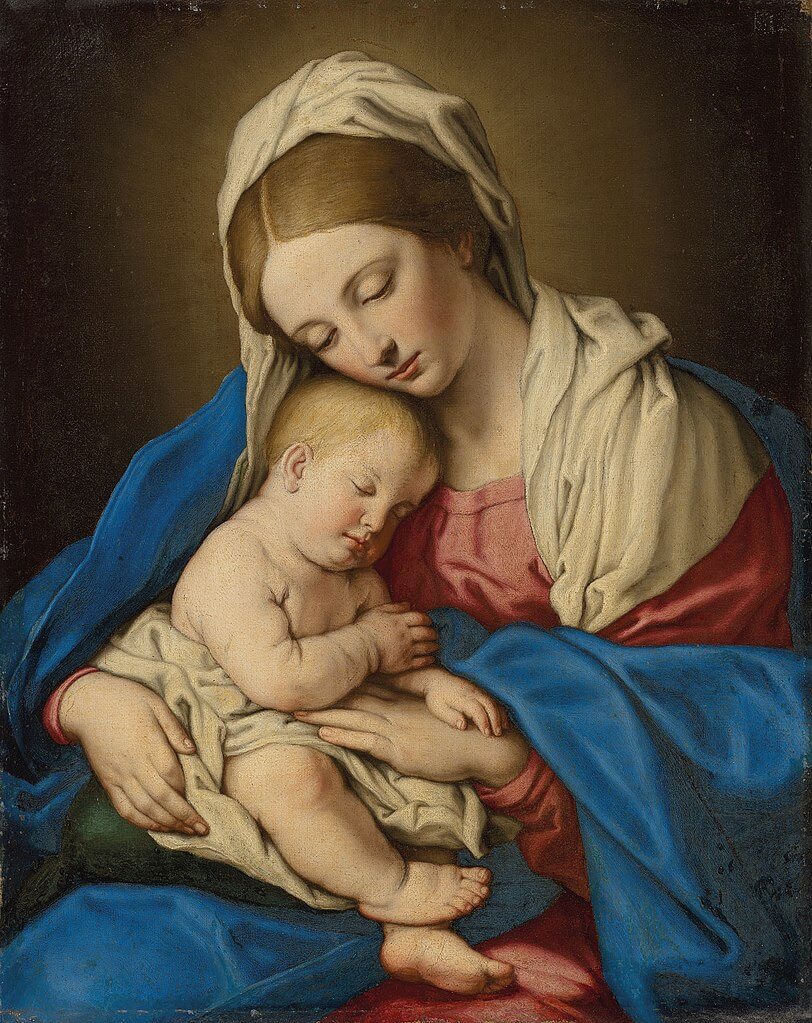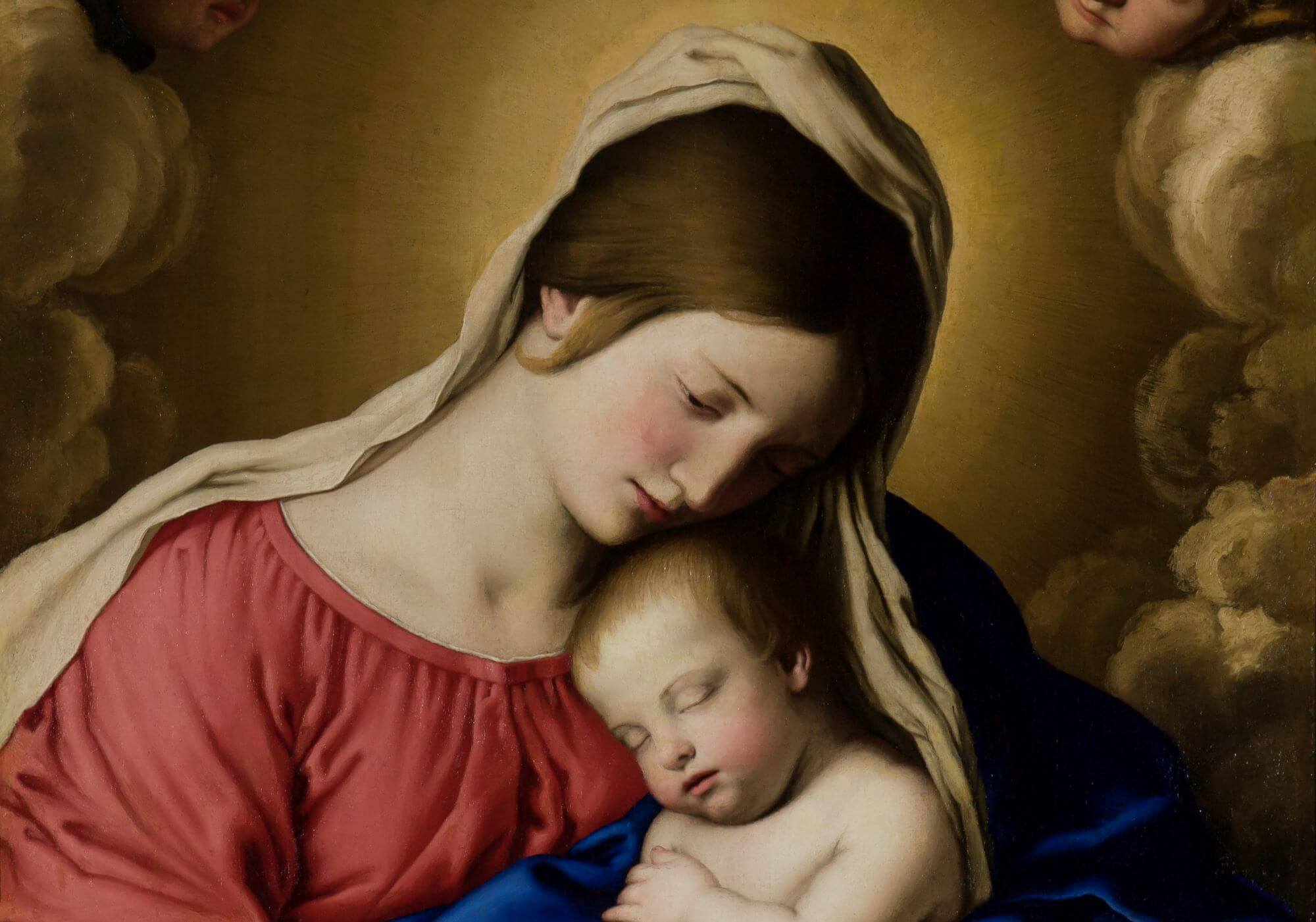
We are called to pattern our lives after that of Jesus Christ. When this seems daunting, it’s helpful to turn to the example of fellow human beings who imitated Him well: the saints.
Ultimately, however, no one has imitated Jesus better than His own Mother. Mary, Mother of God and Mother of Souls, has been given to us as an example which we can strive to imitate. When we draw near to her, she leads us to her Son.
In his classic work True Devotion to the Mary, St. Louis de Montfort lists the “ten principal virtues of the most Holy Virgin Mary.”
They are:
- Profound humility
- Lively faith
- Blind obedience
- Continual prayer
- Universal mortification
- Divine purity
- Ardent charity
- Heroic patience
- Angelic sweetness
- Divine wisdom
These virtues may seem overwhelming at first, but there are simple ways to practice them in everyday life with the help of God’s grace.

1. Profound Humility
- Meaning: Profound – Penetrating or entering deeply into subjects of thought or knowledge. Humility – Free from pride and arrogance; lowliness of mind.
- How Mary demonstrated profound humility: Mary perfectly conformed herself to God’s Will. She saw herself as God saw her, nothing more and nothing less.
- How we can live out this virtue: See yourself as God sees you! Pray the Litany of Humility, accept compliments gracefully and quietly, and don’t be embarrassed to make mistakes in front of others. Don’t be surprised to find faults and sins in your life—just turn to God and ask Him to help you with them.
2. Lively Faith
- Meaning: Lively – Full of life and alertness. Faith – “The infused theological virtue whereby a person is enabled to ‘believe that what God has revealed is true — not because its intrinsic truth is seen with the rational light of reason—but because of the authority of God who reveals it, of God who can neither deceive nor be deceived’ (First Vatican Council, Denzinger 3008)” (Catholic Dictionary).
- How Mary demonstrated lively faith: Mary eagerly and wholeheartedly submitted herself to God. She joyfully surrendered herself to the Lord and put absolute faith in His word and in His promises.
- How we can live out this virtue: Faith is a gift from God. We receive it—we do not manufacture it out of our own hearts. To receive this gift, we must seek communion with the Giver. Choose to trust Him and practice receiving His gifts with open hands.
3. Blind Obedience
- Meaning: Blind — To fully trust in God’s plan for our lives even when we don’t understand it, knowing that He is Truth itself. Obedience — “As a virtue, it is pleasing to God because it means the sacrifice of one’s will out of love for God” (Catholic Dictionary). Obedience is faithfully carrying out the commandments of God.
- How Mary demonstrated blind obedience: Mary was able to confidently give her fiat at the moment of the Annunciation, and also in every circumstance after that.
- How we can live out this virtue: We are called to obey God, even when we don’t fully understand why He asks for certain things. On a practical, daily basis, we can obey the will of God as taught to us through Holy Mother Church. The Church teaches His ten commandments, gives us the spiritual formation we need, transmits His truth, and gives us clear guidance for our actions through such things as the five precepts of the Church: 1) On Sundays and holy days of obligation, attend Mass and rest from servile labor; 2) Confess your sins at least once a year; 3) Receive the Sacrament of the Eucharist at least once during the Easter season; 4) Observe the days of fasting and abstinence from meat established by the Church; and 5) Help provide for the needs of the Church.
4. Continual Prayer
- Meaning: “The Christian practice, advocated by St. Paul, ‘Pray constantly’ (I Thessalonians 5:17), by which a person always remains united with God. Also called the prayer of the heart, it need not be conscious awareness of God’s presence. It implies that a person is constantly ready to do the will of God” (Catholic Dictionary). Continual prayer doesn’t mean praying in a chapel all day, but serving God in our daily duties and seeking to preserve a spirit of prayer and of frequent conversation with Him about anything and everything.
- How Mary demonstrated continual prayer: Mary’s entire life was a prayer, in which she constantly placed herself in the presence of the Lord at every moment of her life.
- How we can live out this virtue: Praise God. Make time for silence, for thanking Him, and for asking help to do His Will. Bring Christ into every little thing, offering up all your thoughts, words, actions, joys, and sorrows. Converse with Him about the things you’re thinking of during the day, turning your stream-of-consciousness conversations with yourself into dialogue with Him.

5. Universal Mortification
- Meaning: Universal – All-encompassing, applicable everywhere. Mortification – Dying to yourself and your own will. “The practice of Christian asceticism in order to overcome sin and master one’s sinful tendencies, and through penance and austerity to strengthen the will in the practice of virtue and grow in the likeness of Christ. Natural mortification is a normal part of self-discipline; supernatural mortification, based on faith, seeks to grow in holiness through merit gained by cooperating with the grace of God. (Etym. Latin mortificatio, a killing, a putting to death.)” (Catholic Dictionary).
- How Mary demonstrated universal mortification: “Not my will, but thine, be done” (Luke 22:42) was the whole of Our Lady’s life: “Behold, I am the handmaid of the Lord; let it be to me according to your word” (Luke 1:38). She mortified herself and her own will by putting God’s first and seeking to unite hers with His.
- How we can live out this virtue: Make sacrifices and offer them up for the greater good of someone else. Accept the small irritations, humiliations, and inconveniences of daily life as quietly as you can. Mortify yourself in little things such as getting up right away when the alarm goes off and not hitting the snooze button! Pray this simple yet difficult prayer: “God, teach me to love your will as my own!”
6. Divine Purity
- Meaning: Divine – Proceeding from God. Exceeding natural human ability. Purity – The state of being free from sin; oneness of heart and mind in seeking God.
- How Mary demonstrated divine purity: Everything in Mary was of God. Her mind and heart were pure. She lived her life with unity of purpose, seeking only to love and honor Him with her whole heart, mind, and soul (see Deuteronomy 6:5).
- How we can live out this virtue: Live a life of prayer and frequent the Sacraments. Strive to keep your heart and body pure, and your mind pure and focused on heavenly things instead of the things of this world. Seek to purify your intentions. Don’t manipulate others, for example, saying something in order to obtain a certain response from them. Instead, act with simplicity and directness with everyone you encounter. Let your yes mean yes and your no mean no (see Matthew 5:37).
7. Ardent Charity
- Meaning: Ardent – characterized by warmth of feeling or passion. Charity – “The infused supernatural virtue by which a person loves God above all things for His own sake, and loves others for God’s sake” (Catholic Dictionary).
- How Mary demonstrated Ardent Charity: Every action that Mary performed for those around her was done out of love for her Lord.
- How we can live out this virtue: Imitate the Blessed Mother and take on the disposition of love for those around you by bringing Jesus to them, the true and perfect Lover.
8. Heroic Patience
- Meaning: Heroic — “The performance of extraordinary virtuous actions with readiness and over a period of time. The moral virtues are exercised with ease, while faith, hope, and charity are practiced to an eminent degree” (Catholic Dictionary). Patience — “[T]o endure present evils without sadness or resentment in conformity with the will of God” (Catholic Dictionary).
- How Mary demonstrated heroic patience: Mary gave her fiat, her “yes” to Christ. Her heroic patience culminated at the foot of the cross, where she truly became a martyr through suffering in union with her Son.
- How we can live out this virtue: Unite your sufferings with the sufferings of Our Lord and Our Lady of Sorrows. Pray for the gift of perseverance and cultivate silence in your life and in your heart.
9. Angelic Sweetness
- Definition: Angelic – Manifesting goodness, purity, and selflessness. Sweetness – a pleasing disposition that is lovable, kind, and gracious.
- How Mary demonstrated Angelic Sweetness: Our Lady radiated joy and peace to everyone she encountered.
- How we can live out this virtue: We can open our hearts to the grace that is available to us and show gratitude for God’s blessings. We can smile and be kind, friendly, and alert to the needs of others, putting them before our own.
10. Divine Wisdom
- Meaning: Divine – Proceeding from God. Wisdom: “The first and highest gifts of the Holy Spirit. It makes the soul responsive to God in the contemplation of divine things…Built into wisdom is the element of love, which inspires contemplative reflection on these divine mysteries, rejoices dwelling on them, and directs the mind to judge all things according to their principles” (Catholic Dictionary).
- How Mary demonstrated divine wisdom: Mary was able to see the beauty of God’s will in every moment. She didn’t run to others first; she always conversed with the Lord first, so that she could know His Will and put it into action.
- How we can live out this virtue: Ask the Holy Spirit for the wisdom to see all things with the eyes of Christ and not with your own. Ask Our Lady, Seat of Wisdom, to pray for you!
A Virtue at a Time
The key to any kind of lasting growth is to start small. A good idea is to pick one of Mary’s ten virtues each week, month, or year, and to practice it in everyday situations.
Remember: the Blessed Mother is right there with you every step of the way. Don’t hesitate to ask for her guidance and assistance.
Lastly, don’t be afraid to grow in love for Our Lady. As St. Maximilian Kolbe said,
“Never be afraid of loving the Blessed Virgin too much. You can never love her more than Jesus did.”





